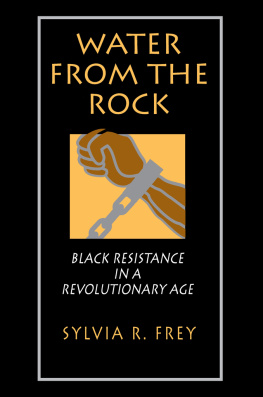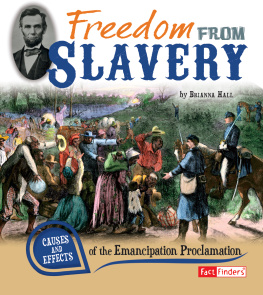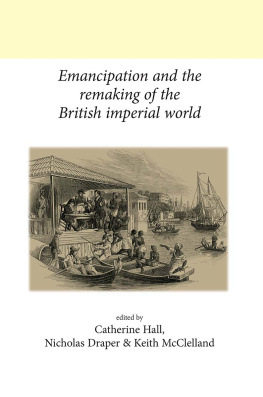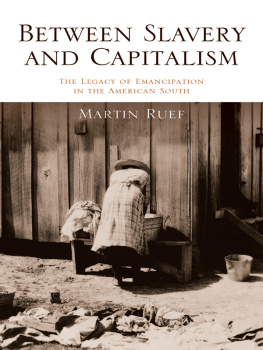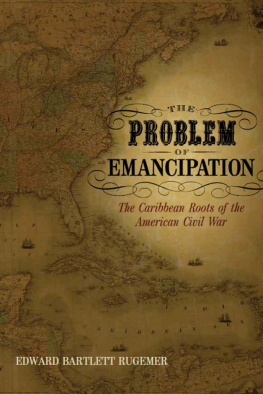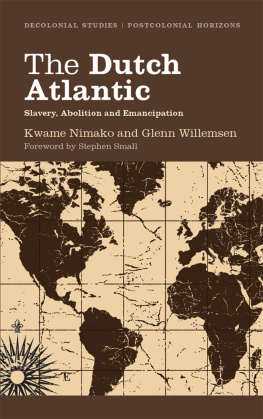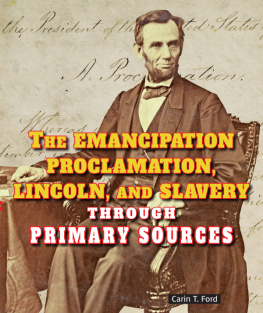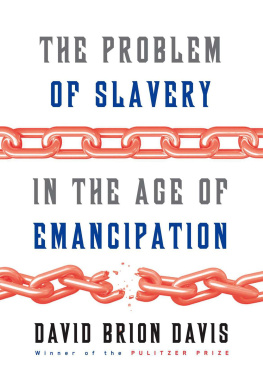
STUDIES IN SLAVE AND POST-SLAVE SOCIETIES AND CULTURES
Series Editors: Gad Heuman and James Walvin
FROM SLAVERY TO EMANCIPATION IN THE ATLANTIC WORLD
STUDIES IN SLAVE AND POST-SLAVE SOCIETIES AND CULTURES
Series Editors: Gad Heuman and James Walvin
ISSN 1462-1770
Other Titles in the Series
Unfree Labour in the Development of the Atlantic World
edited by Paul E. Lovejoy and Nicholas Rogers
Small Islands, Large Questions
Society, Culture and Resistance in the Post-Emancipation Caribbean
edited by Karen Fog Olwig
Reconstructing the Black Past
Blacks in Britain 1780-1830
by Norma Myers
Against the Odds
Free Blacks in the Slave Societies of the Americas
edited by Jane G. Landers
Routes to Slavery
Direction, Ethnicity and Mortality in the Atlantic Slave Trade
edited by David Eltis and David Richardson
Popular Politics and British Anti-Slavery
The Mobilisation of Public Opinion against the Slave Trade, 1787-1807
by J.R. Oldfield
Classical Slavery
by M.I. Finley
Slavery and Colonial Rule in Africa
edited by Suzanne Miers and Martin Klein
First published in 1999 by
FRANK CASS PUBLISHERS
This edition published 2013 by Routledge
2 Park Square, Milton Park, Abingdon, Oxon OX14 4RN
711 Third Avenue, New York, NY 10017
Routledge is an imprint of the Taylor & Francis Group, an informa business
Copyright 1999 Frank Cass Publishers
British Library Cataloguing in Publication Data
From slavery to emancipation in the Atlantic world.
(Studies in slave and postslave societies and cultures)
1. Slavery United States History 2. Slavetrade History
3. Slaves Emancipation
I. Frey, Sylvia R., 1935 II. Wood, Betty, 1945
306.36209
ISBN 0-7146-4964-3 (cloth)
ISBN 0-7146-8025-7 (paper)
ISSN 1462-1770
Library of Congress Cataloging-in-Publication Data
A catalog record for this book is available from the Library of Congress
This group of studies first appeared as a special issue of Slavery and Abolition, Vol.20, No.l, April 1999 (ISSN 0144-039X), published by Frank Cass.
All rights reserved. No part of this publication may be reproduced, stored or introduced into a retrieval system or transmitted, in any form or by any means, electronic, mechanical, photocopying, recording, or otherwise, without the prior written permission of the publisher of this book.
Contents
Sylvia R. Frey and Betty Wood
Linda M. Heywood
Daniel H. Usner, Jr.
Mary Turner
Rosanne Marion Adderley
Julie Saville
Rebecca J. Scott
Lawrence N. Powell
Theresa A. Singleton
SYLVIA R. FREY and BETTY WOOD
In recent years a number of studies have created a surge of new interest in the Atlantic dimensions of Western history: in migration and settlement patterns, family organization and social structures, demography and politics, agriculture and religion, economic development and consumer behaviour. The burden of these investigations suggests that the modern world has been shaped by a complex series of dialectics that link together the histories of many different and distinct cultures in a vast global system. It also suggests that the intricate societies that made up the Atlantic world shared certain common characteristics as well as marked differences and points to the possibilities for exploring a whole host of historical issues and for making explicit intertopical comparisons.
It was these possibilities which inspired the formation in 1995 of the Tulane-Cambridge Atlantic Studies group, a long-term collaborative project of the Faculties of History of Tulane University and the University of Cambridge. Our intention was to create a unique forum for international and inter-disciplinary dialogue for the purpose of exploring the interconnections between economic, political, moral, and cultural realms as an Atlantic World experience. To that end we brought together in a conference setting a group of eminent scholars from Europe, the Caribbean, Canada, and the United States to focus on the differential aspects of two broad structural changes that were common to many societies of the Atlantic world the establishment of slavery and emancipation on race, class, and gender. The geographic context for the project was the American South, the Caribbean, Latin America, and West Africa. The papers in this volume were presented at the inaugural conference held at Tulane University in November 1996.
Ours is a deliberately complex approach, dealing as it does with different groups of people in scattered and vastly different geographic regions and societies. It is precisely this complexity that we expected would shed light on certain critical questions: what can be learned by examining slavery in the Americas and in the African context about patterns of adjustment and change? To what extent did enslaved peoples succeed in creating a dynamic world of interaction within the Americas; across the Atlantic? What was the reaction of Africans to Europeans (and vice versa) outside the context of How did such factors as social geography and spatial organization affect the experiences of different groups of enslaved peoples? How, specifically, were experiences gendered?
The experience of emancipation raised a different set of questions, the principal one being the question of freedom. Who defined freedom and for what purposes? Did emancipation produce a shift in attitudes toward slavery among the enslavers; toward former enslaved peoples? Did different labour regimes of emancipation change patterns of labour usage and relationships between workers as well as between workers and their former owners? To what extent were the work experiences of liberated slaves similar to and different from those of enslaved peoples? What can we say of the creative and political work of enslaved and free peoples? Viewed both from the African and the American side how is slavery remembered? What is the link between remembering and forgetting the experiences of slavery and identity formation? What are the theoretical and methodological implications of the conferences findings?
The papers included in this collection form a representative sample of those presented to the inaugural conference. They address some but by no means all of the issues raised by the Tulane-Cambridge Atlantic Studies Group. They illuminate certain spatial and temporal conjunctions and contrasts, but reveal no definitive narrative. Nor did we expect them to. Viewed in relationship to one another and in the context of existing scholarship they cast interesting light on three broad subjects: the moral as well as the political dimensions of slavery and emancipation; the role of ritual and memory in the process of politicization; and the role of memory in the construction of identity. We present these essays with editorial comments in the hope that they will generate discussion and encourage further exploration of the many links that connected and continue to connect human beings on both sides of the Atlantic as well as the various linkages between internal and external developments.
Linda Hey woods paper sets out what is a recurring theme in the history of slavery and emancipation, the interaction of European and African peoples in the same cultural, economic, and political fields. Whether in African or New World slave societies, African and European ideologies and practices existed concurrently, at times complementing, at times testing one another. The continuing dialogue produced new ideologies and practices that transcended and transformed their antecedents. In a major conceptual breakthrough, Heywood describes a complicated transcultural process that evolved through three stages: the transformation of West Central African culture in Portugal; Luso-African tranculturization in Kongo and Angola; and the evolution of a more complex form of Luso-African culture in Brazil. Central to her thesis is the paramount role of Roman Catholicism in every stage of this process.



